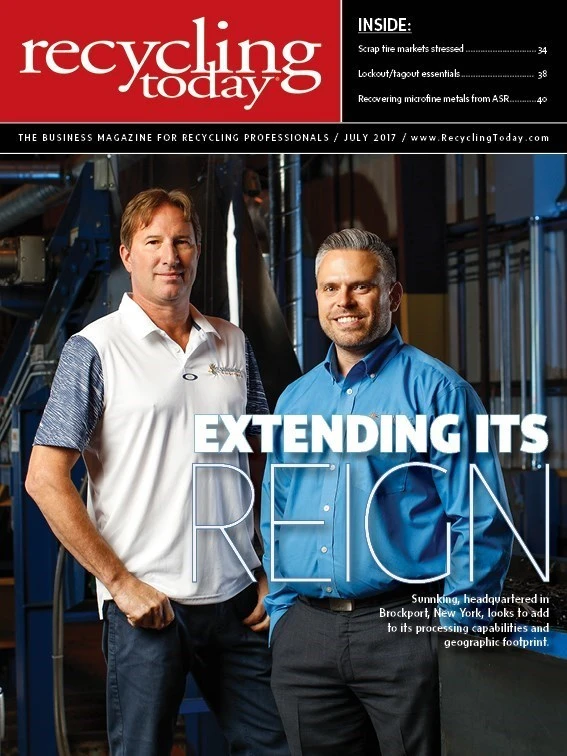
SC Johnson says it has found an application for Ziploc bags recycled curbside
SC Johnson, headquartered in Racine, Wisconsin, has announced that it has reached a milestone in its quest to recycle Ziploc brand bags collected via curbside bins, avoiding millions of pounds of plastic from ending up in landfills. The company says it is converting flexible film that includes
Developing a way to reuse Ziploc bags and other types of plastic film is a key step in the process to make recycling for these materials available at the curb, SC Johnson says. While 18,000-plus stores accept Ziploc bags for recycling, those efforts capture only about 0.2 percent of Ziploc bags sold, the company says. Finding a way to allow Ziploc bags to be collected curbside and then recycled will make the practice more convenient and will boost recycling numbers, as only about one-third of U.S. residents currently recycle them at drop-off locations, SC Johnson adds.
“For decades we have worked to lighten our environmental footprint,” says Fisk Johnson,
The search took the company to Europe, which has the equipment needed to wash soiled plastic film to prepare it for reuse and recycling, SC Johnson says. After converting the rinsed plastic film into pellets, another European company melted down the pellets and converted them into garbage bags.
SC Johnson says it is testing the same process in the U.S. with a recycling facility and garbage bag manufacturer. The company says it also is considering additional uses for the collected material, such as pallets and construction beams. SC Johnson says it has no plans to mass produce or sell garbage bags made from recycled Ziploc brand bags, though it will sell limited quantities on its Green Choices website, www.scjohnson.com/en/green-choices/overview.aspx, by the end of the year.

APR announces pharmacy stock bottle recycling resources
The Association of Plastic Recyclers (APR), Washington, has developed resources for pharmacies to recycle stock bottles. In support of APR’s primary goals to increase the supply and enhance the quality of recycled plastics, it has identified pharmacy stock bottles as a highly marketable, quality stream of high-density polyethylene (HDPE), the organization says.
“Pharmacies offer a unique grocery store waste reduction opportunity,” says Liz Bedard, APR rigid plastics recycling director. “Many pharmacies are making the switch from disposing of large volumes of stock bottles to setting up dedicated pharmacy stock bottle recycling collection bins.”
Pharmacy waste is divided evenly between stock bottles and paper, the APR says. Through the combination of a pharmacy stock bottle recycling program and a paper recycling program, grocery stores and pharmacies can achieve zero waste with no incremental increase in labor costs and with waste hauling and disposal savings, as well as with potential revenue.
“As we have seen the Recycling Grocery Rigid Plastics program grow to include 32 states, 10 national chains and 4,500 stores, a Pharmacy Stock Bottle Recycling program was the next logical step,” says Steve Alexander, APR executive director.
Sponsored Content
Labor that Works
With 25 years of experience, Leadpoint delivers cost-effective workforce solutions tailored to your needs. We handle the recruiting, hiring, training, and onboarding to deliver stable, productive, and safety-focused teams. Our commitment to safety and quality ensures peace of mind with a reliable workforce that helps you achieve your goals.
Sponsored Content
Labor that Works
With 25 years of experience, Leadpoint delivers cost-effective workforce solutions tailored to your needs. We handle the recruiting, hiring, training, and onboarding to deliver stable, productive, and safety-focused teams. Our commitment to safety and quality ensures peace of mind with a reliable workforce that helps you achieve your goals.
The APR has added its pharmacy resources to the “How to Recycle Grocery Rigid Plastics Guidebook,” They include steps for a recommended approach to starting the recycling program, photos, potential revenue figures, sample signage, frequently asked questions and a case study of a Stop & Shop pharmacy.
More information is available at http://recyclegroceryplastics.org.
Get curated news on YOUR industry.
Enter your email to receive our newsletters.

Explore the July 2017 Issue
Check out more from this issue and find your next story to read.
Latest from Recycling Today
- LumiCup offers single-use plastic alternative
- European project yields recycled-content ABS
- ICM to host colocated events in Shanghai
- Astera runs into NIMBY concerns in Colorado
- ReMA opposes European efforts seeking export restrictions for recyclables
- Fresh Perspective: Raj Bagaria
- Saica announces plans for second US site
- Update: Novelis produces first aluminum coil made fully from recycled end-of-life automotive scrap






